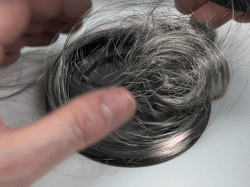Rise and fall of the wire recorder
March 07, 2018
on
on

still from Retro Tech: The Wire Recorder,
video by Techmoan
AC bias eliminates distorsion and noise
Roughly half a century later, between 1946 and 1954, magnetic recording had experienced a decade of widespread use with the advent of wire recorders (mainly in the USA) and tape recorders (mainly in Germany) used barely for speech (radio, Dictaphones, etc). Music recording was compromised by the distortion and noise inherent in the process of magnetic recording.The wire recorders, of which every sound recording enthusiast has necessarily heard, few have seen them and those who have used them are no longer. The decline of the wire recorder was as sharp as its rise. It was swept aside by the tape recorder. Existing in Germany since the early 1930s, the use of tape for music recording was finally established after WWII. The serendipitous discovery around 1940 of the effect of AC bias on magnetism, using an inaudible high-frequency, made it possible to obtain good quality music recordings on tape, free of distortion.
Machines many people haven't seen or heard in action
This week, we’ll have a “light-hearted look at an almost-forgotten technology that many people haven't seen or heard in action” as stated by the author. “You get to see and hear in action a 63 year old machine that is in pristine condition.”One commentator, who pinpointedly calls himself Paradox, perfectly sums up the effect this video has had on me:
Will I ever own one of these? No.
Will I ever listen to one of these? No.
Will I ever see one of these in real life? No.
Will I watch the video multiple times nonetheless? You bet I will.
Read full article
Hide full article


Discussion (2 comments)